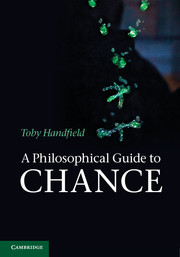Book contents
- Frontmatter
- Contents
- Preface
- 1 The concept of chance
- 2 The classical picture: What is the world made of?
- 3 Ways the world might be
- 4 Possibilities of thought
- 5 Chance in phase space
- 6 Possibilist theories of chance
- 7 Actualist theories of chance
- 8 Anti-realist theories of chance
- 9 Chance in quantum physics
- 10 Chance in branching worlds
- 11 Time and evidence
- 12 Debunking chance
- References
- Index
6 - Possibilist theories of chance
Published online by Cambridge University Press: 05 June 2012
- Frontmatter
- Contents
- Preface
- 1 The concept of chance
- 2 The classical picture: What is the world made of?
- 3 Ways the world might be
- 4 Possibilities of thought
- 5 Chance in phase space
- 6 Possibilist theories of chance
- 7 Actualist theories of chance
- 8 Anti-realist theories of chance
- 9 Chance in quantum physics
- 10 Chance in branching worlds
- 11 Time and evidence
- 12 Debunking chance
- References
- Index
Summary
We understand the actual world only when we can locate it accurately in logical space.
(Bigelow and Pargetter 1990)Possibilism
In the opening chapter, I characterised chance as the degree of belief recommended by the best identifiable advice function, given the available evidence. In the following chapters, I have sketched the sort of conceptual tools used by physicists to obtain probabilities in classical statistical mechanics: a measure over phase space. So a naive response to this presentation is to think that classical statistical mechanics actually tells us what makes a fact of chance. It is a measure over a space of possibilities. The space of possibilities contains the states the system might be in, given the available evidence. Given the right measure – something that we have confirmed by experience – chances are just facts about the relative measures of different macro-conditions. Call this the modal volume theory of chance. In order to assess this idea adequately, we first need to unpack it.
Chances are ratios of volumes
Given I toss a coin, what is the chance that it will land heads? The answer has something to do with two sets of possibilities: that in which I toss a coin, and that in which I toss a coin and it lands heads.
- Type
- Chapter
- Information
- A Philosophical Guide to ChancePhysical Probability, pp. 78 - 103Publisher: Cambridge University PressPrint publication year: 2012



